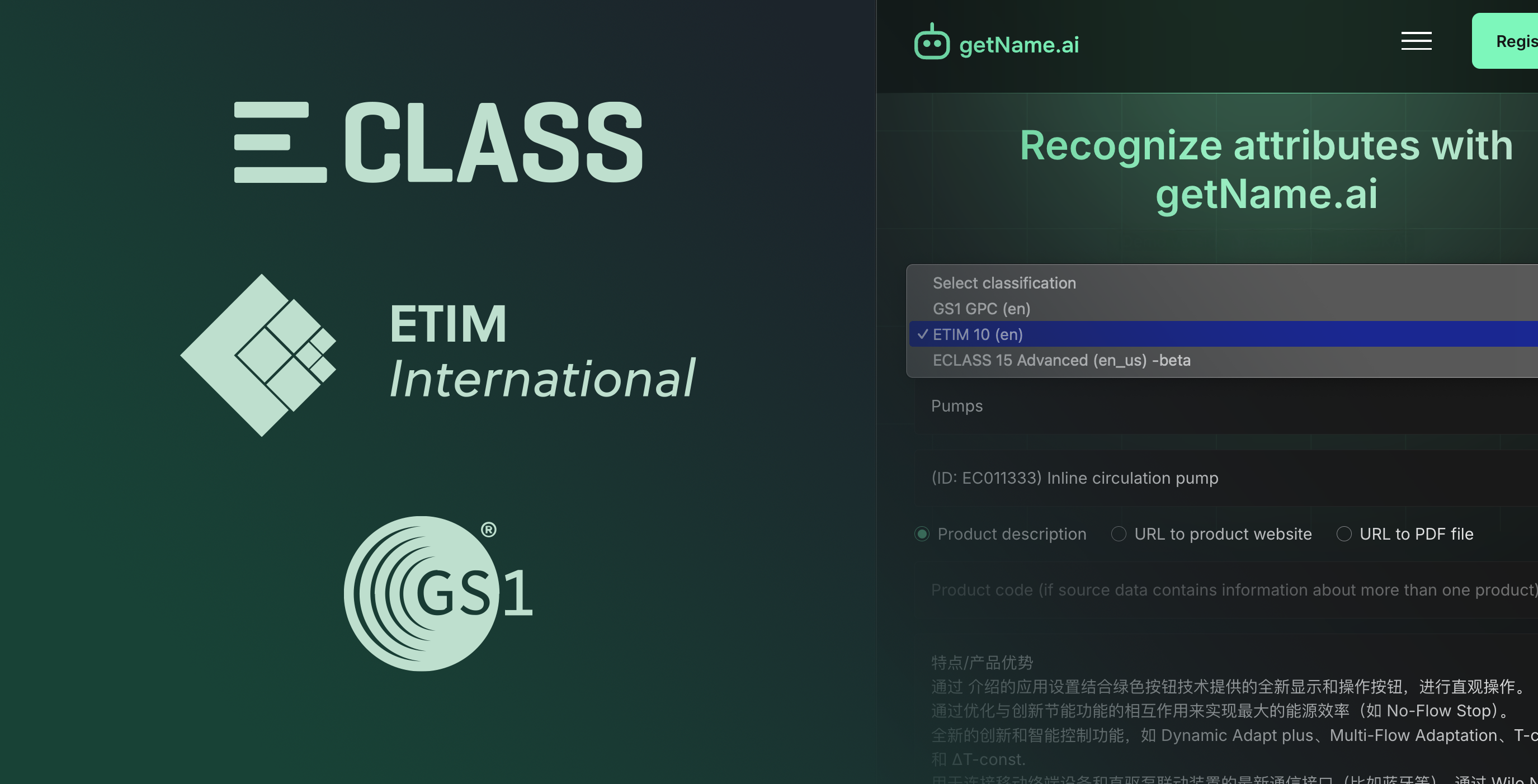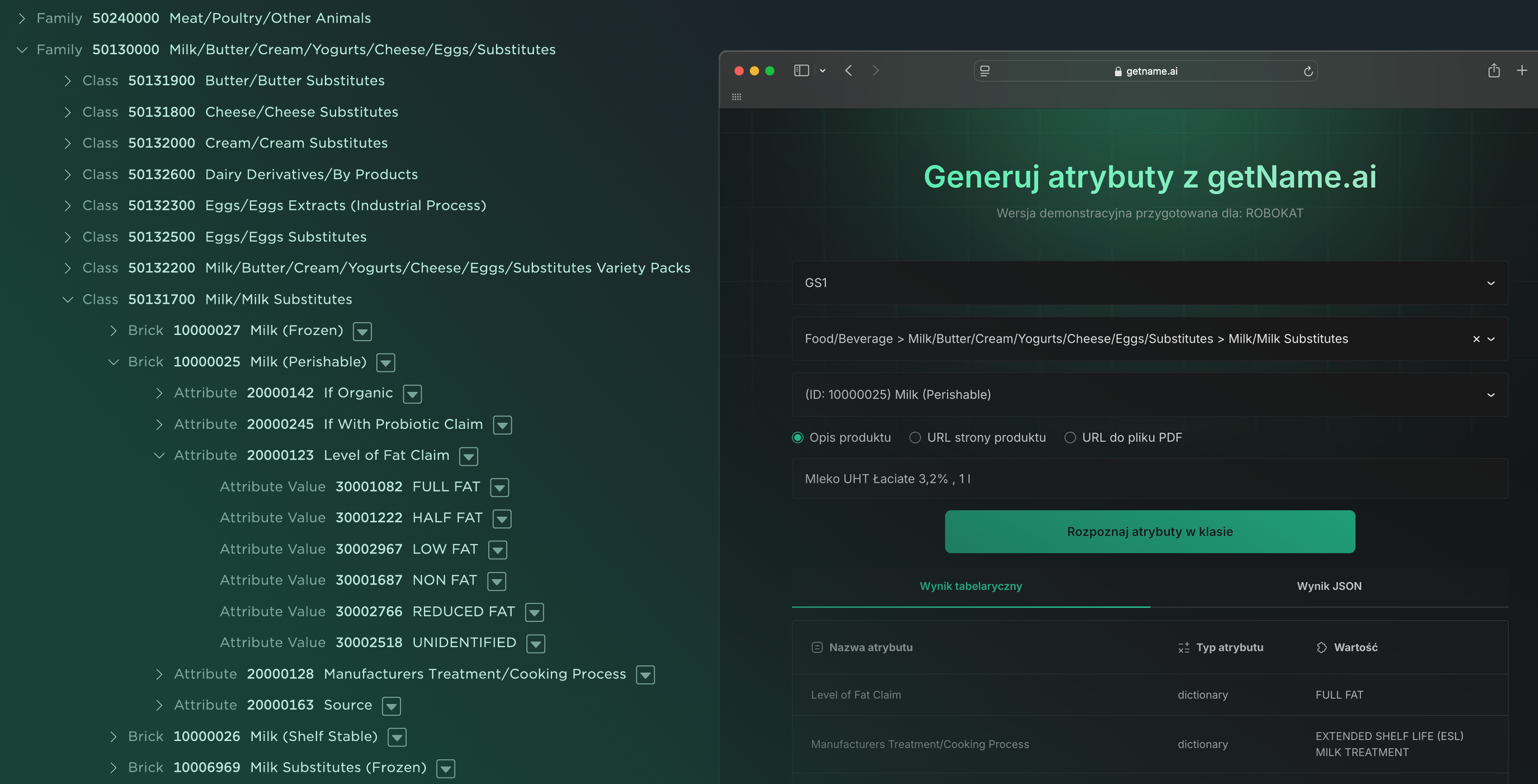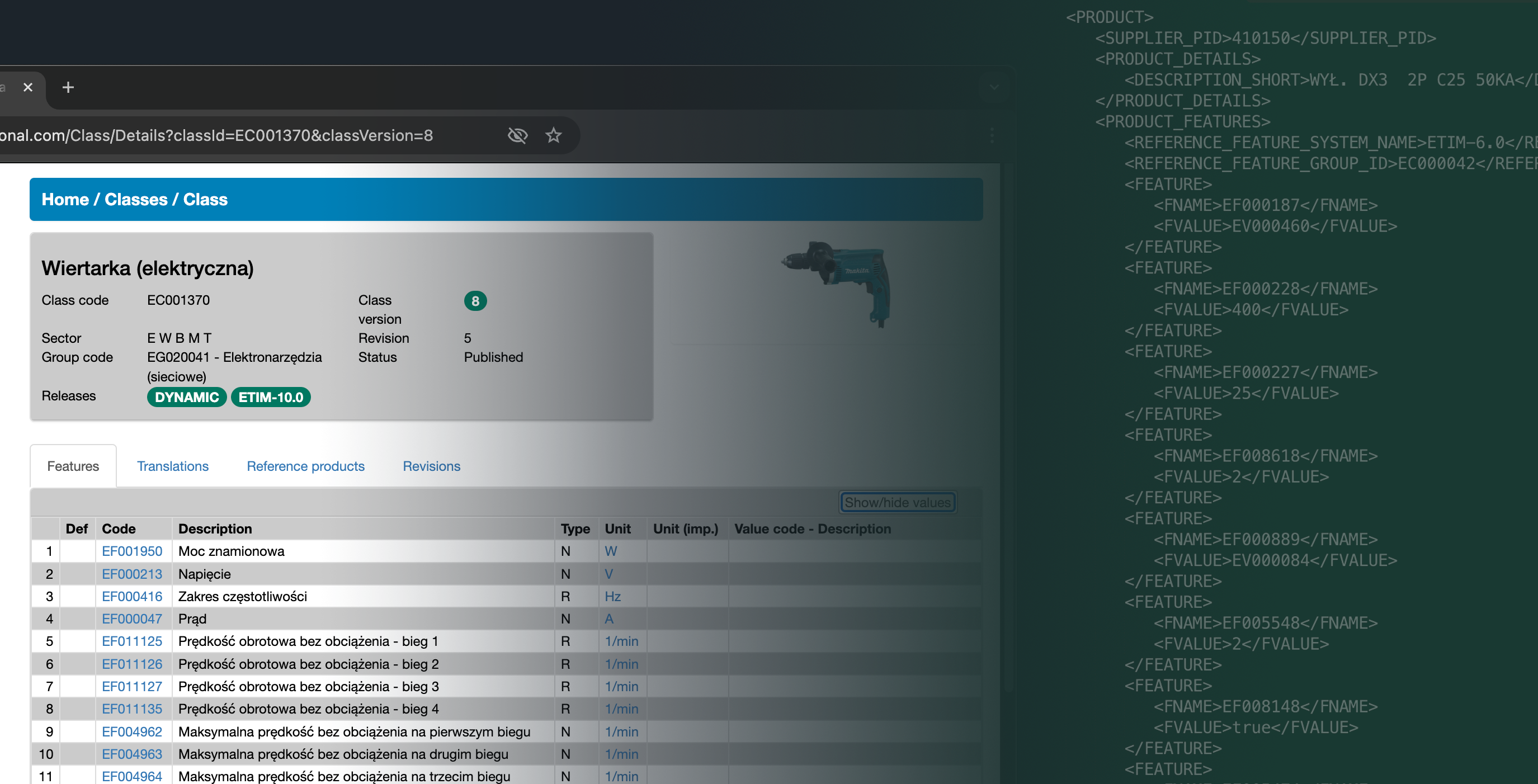Complete solution for global manufacturers: advanced automation for ETIM, ECLASS, and GPC standards

- Streamlined implementation for export-focused manufacturers
- Managing classification standard evolution
- Strategic business benefits for manufacturers
- Traditional approach vs. automation with getName.ai
- Maximizing existing PIM system investment
- Strategic challenges in international Product Data Management
- Syndication platforms supporting global expansion
- Integrated data flow in global expansion
- Critical classification standards for global market access
- Leveraging PIM Systems for multi-standard data governance
We're introducing an enterprise-grade solution that automatically determines attribute values across three critical global product classification standards - ETIM, ECLASS, and GPC (GS1) - without manual intervention or data preprocessing.
Our proprietary AI technology analyzes existing product data assets - including unstructured descriptions, technical specifications, and internal classification systems - to intelligently map product attributes to the required standards for each target market. This eliminates the resource-intensive data transformation processes that traditionally delay international market entry and strain technical resources.
Strategic challenges in international Product Data Management
Manufacturers expanding internationally face a complex product data landscape with significant strategic implications:
- Market-specific standards fragmentation - regional markets operate on different classification frameworks, requiring parallel maintenance of product information architecture
- Multilingual compliance requirements - maintaining data accuracy across language barriers presents both technical and semantic challenges
- Continuous standards evolution - classification systems undergo regular version updates, creating ongoing compliance management overhead
- Technical integration complexity - each market's distribution channels may require unique data structures and validation protocols
Traditional approaches typically involve specialized teams maintaining multiple discrete data sets — a strategy that introduces substantial operational overhead, creates scalability bottlenecks, and significantly extends time-to-market for new territories. In competitive international markets, this implementation lag directly impacts market penetration capabilities.
Critical classification standards for global market access
ETIM (European Technical Information Model)
ETIM has established itself as the authoritative standard across European electrotechnical, HVAC, and building materials sectors. With its rigorously defined classification hierarchy and standardized technical attributes, it enables precise product specification and comparison.
Key markets where ETIM compliance is business-critical:
- Germany and DACH region (primary market driver)
- Benelux countries (early adopters with high compliance requirements)
- Nordic markets (strong implementation across supply chains)
- Southern European markets including France and Spain (growing adoption)
For manufacturers in relevant sectors, ETIM compliance has evolved from competitive advantage to market entry requirement. The standard's widespread adoption throughout distribution channels means non-compliant products face significant visibility and discoverability limitations.
Our AI engine parses product information to automatically generate ETIM-compliant attribute sets, maintaining consistent technical accuracy regardless of source language or data structure. This eliminates the traditional requirement for specialized ETIM knowledge within product data teams.
ECLASS
ECLASS represents the comprehensive industrial standard for cross-sector product and service specification, with particular strength in manufacturing and engineering domains. Originally developed for German industrial applications, it has expanded to become the reference standard for sophisticated B2B product data exchange.
ECLASS implementation is particularly critical in:
- Automotive manufacturing and supplier networks
- Industrial machinery and automation sectors
- Specialty chemical industries
- Precision electronics and components
For manufacturers integrated into German and Central European supply chains, ECLASS compliance is often contractually mandated by enterprise buyers. The standard's deep integration into procurement systems, ERP platforms, and digital catalogs makes it an essential component of industrial sales enablement.
Our system efficiently processes technical documentation to extract and map the complex parameter sets required by ECLASS, automatically structuring them according to the standard's hierarchical classification model — even from unformatted or semi-structured source materials.
GPC (Global Product Classification) from GS1
GPC provides the classification foundation for the GS1 ecosystem, enabling standardized product identification and data synchronization across global retail and distribution networks. Its comprehensive coverage makes it particularly valuable for consumer goods, food products, and FMCG manufacturers.
GPC implementation delivers strategic advantages in:
- North American retail and distribution channels
- UK and Commonwealth markets
- Australia and New Zealand
- Key Asian markets, particularly Japan, South Korea, and increasingly China
GPC-compliant product data unlocks access to major international retail chains and marketplace platforms. Additionally, it enables participation in GDSN (Global Data Synchronisation Network) — increasingly a non-negotiable requirement for suppliers to enterprise retail buyers.
Leveraging PIM Systems for multi-standard data governance
An effective Product Information Management (PIM) solution forms the cornerstone of international market data strategy. For manufacturers with global aspirations, PIM systems provide the architectural foundation for managing the complexity of multi-standard product information.
Enterprise PIM platforms typically deliver capabilities including:
- Centralized product information repository with governance workflows
- Multi-versioning support for attributes across standards and markets
- Comprehensive product lifecycle state management
- Channel-specific export transformation capabilities
Our solution complements existing PIM infrastructure by automating the resource-intensive process of standards-compliant attribute generation. This integration establishes an efficient operational model: getName.ai delivers precisely mapped attribute sets for ETIM, ECLASS, and GPC standards, while your PIM system manages their storage, workflow, and distribution logic.
A key technical advantage of our approach is its ability to work with existing product data assets. The system processes standard product descriptions already maintained in your PIM, analyzing them in context of each classification standard. This means a single comprehensive product description can automatically generate separate compliant attribute sets for each standard — eliminating redundant data maintenance and manual cross-standard mapping.
Streamlined implementation for export-focused manufacturers
Integration of getName.ai into manufacturing environments follows a methodical process optimized for rapid time-to-value:
- Strategic requirements analysis - assessment of target markets and corresponding classification requirements based on export priorities
- Technical integration - implementation of API connections to enterprise systems (typically PIM or ERP) with appropriate security and governance models
- Product classification mapping - systematic assignment of product groups to appropriate classification classes within each standard
- Validation and quality assurance - empirical verification of attribute recognition accuracy using representative product samples
- Production deployment - systematic rollout and process automation for the entire product portfolio
Implementation timeframes range from days to weeks depending on catalog scale and integration complexity. Notably, the system does not require your team to develop specialized expertise in each classification standard — the intelligence engine manages the complexity of standard-specific attribute mapping and validation rules.
Managing classification standard evolution
Classification standards undergo systematic revision cycles, introducing new classes, attributes, and values. For manufacturers operating in international markets, monitoring these changes and maintaining compliance poses a significant operational challenge.
getName.ai automatically handles different versions of standards, eliminating the need for manual update management. The system continuously incorporates the latest editions of ETIM, ECLASS, and GPC, ensuring manufacturers remain compliant with current market requirements without any internal resource allocation.
A particularly valuable capability is the simultaneous support for multiple versions of the same standard. This becomes critical when different business partners require data compliant with different classification versions. The system automatically generates appropriate attribute values for the specified version, eliminating the need for manual data adaptation or maintaining parallel datasets.
Moreover, getName.ai effectively analyzes descriptions containing information relevant to earlier classification versions. This means manufacturers can leverage their existing product data as the foundation for generating attributes compliant with newer standard versions, without needing to create new descriptions from scratch.
Strategic business benefits for manufacturers
Implementing getName.ai delivers manufacturers with international ambitions measurable strategic advantages:
- Accelerated market entry - Data preparation automation reduces the time required to adapt products to local requirements from weeks to hours
- Operational cost reduction - Direct attribute generation eliminates the need for specialists in individual standards
- Data quality improvement - Automated attribute recognition eliminates human errors and ensures data consistency
- Distribution reach expansion - Compliance with multiple standards opens doors to broader networks of distributors and marketplaces
- Market selection flexibility - The ease of generating data compliant with various standards enables rapid testing of new markets and sales channels
- Internal process optimization - Automated product data management releases resources that can be redirected to product development and marketing strategy
For medium-sized manufacturers managing product portfolios of 10,000-20,000 SKUs, automation-derived savings can reach several thousand euros monthly. Even more significant are the strategic benefits: the ability to respond rapidly to market opportunities and eliminate delays associated with product data adaptation.
Traditional approach vs. automation with getName.ai
The traditional approach to international product classification standards management involves numerous challenges and limitations. The following comparison illustrates key differences between conventional methods and automation using getName.ai:
| Aspect | Traditional Approach | Automation with getName.ai |
|---|---|---|
| Preparation time | Weeks to adapt catalog to new standard | Hours to generate attributes for entire catalog |
| Personnel costs | Employing specialists with knowledge of individual standards | Single service handling all standards |
| Scalability | Limited by team capabilities | Unlimited - thousands of products processed automatically |
| Updates | Manual tracking of standard changes and data adaptation | Automatic support for latest standard versions |
| Data quality | Risk of human errors and inconsistencie | Consistent and precise attribute identification |
| Multilingual support | Requires description translation | Handles descriptions in any language |
| Processing model | Requires mapping rules and conversion tables | Direct generation of ready-to-use attribute values |
The fundamental difference is that getName.ai completely eliminates the need for manual attribute transformation between different standards. For each query, the system analyzes the product description and directly generates a complete set of attributes compliant with the selected standard. This means manufacturers don't need to maintain complex mapping tables or update them when standards change.
Maximizing existing PIM system investment
Your current Product Information Management system provides a solid foundation for getName.ai integration. To fully leverage the potential of both solutions, consider several implementation aspects:
- Integration process optimization - Efficient connection between your current PIM and getName.ai enables automatic data flow between systems
- Existing resource utilization - Current product descriptions serve as the basis for automatic attribute generation across different standards
- Data export enhancement - Adapting existing export templates to handle new attributes generated by getName.ai
- Workflow automation - Integration with getName.ai can be an opportunity to optimize product data management processes
Even if your current PIM system wasn't originally designed to handle multiple classification standards simultaneously, integration with getName.ai can significantly extend its capabilities without requiring migration to a new solution.
Syndication platforms supporting global expansion
Effective international expansion requires not only accurate product data but also efficient distribution channels. Syndication platforms serve as a natural complement to getName.ai, enabling efficient delivery of generated data to diverse recipients across global markets.
Specialized syndication platforms
Professional syndication platforms offer advanced product data distribution capabilities, often with additional validation and content enrichment functions:
- 1WorldSync - global data exchange platform in GS1 standard, particularly popular among FMCG and consumer goods manufacturers, collaborating with major retail chains
- Productsup - comprehensive solution for product data management and distribution to multiple sales channels
- Distributor Data Solutions (DDS) - platform dedicated to construction, electrical, and industrial sectors, supporting both ETIM and ECLASS
- BYRD - specializes in electrical and plumbing industries, offering deep integration with the ETIM standard
Using getName.ai in conjunction with these platforms enables manufacturers to deliver properly classified product data to global distribution channels, eliminating manual work associated with preparing different export formats.
Channel and Product Feed Management Systems
Beyond specialized syndication platforms, manufacturers can utilize tools for managing product feeds, which focus on efficient data distribution to marketplaces and e-commerce platforms:
- ChannelAdvisor - Advanced tool for multichannel sales management, strongly focused on conversion optimization
- Feedonomics - Platform utilizing advanced algorithms to optimize product feeds and increase visibility
- ChannelEngine - Solution dedicated for medium and large companies, providing integration with major marketplaces
- Channable - Platform enabling easy integration with over 2,500 sales channels worldwide
- Lengow - European leader in feed management, particularly effective in serving EU markets
Using getName.ai in combination with selected channel management systems creates a complete ecosystem where product data is automatically:
- Recognized and transformed into standard-compliant attribute values
- Enriched with necessary technical attributes
- Distributed to appropriate sales channels in relevant markets
Integrated data flow in global expansion
The optimal data flow model for international expansion combines three key elements:
- PIM System - Central repository for product data
- getName.ai - Automatic generation of standard-compliant attribute values according to ETIM, ECLASS, and GPC (GS1) standards
- Syndication Platform - Distribution of enriched data to recipients in various markets
This architecture eliminates bottlenecks associated with manual data preparation, offering:
- Complete process automation from data acquisition to distribution
- Information consistency across all sales channels
- Rapid adaptation to changing market requirements
- Solution scalability as the company grows
For manufacturers planning international expansion, selecting the appropriate syndication platform is as important as ensuring product data accuracy. The best results can be achieved by implementing both getName.ai and a carefully selected syndication platform tailored to the specific industries and target markets being served.


